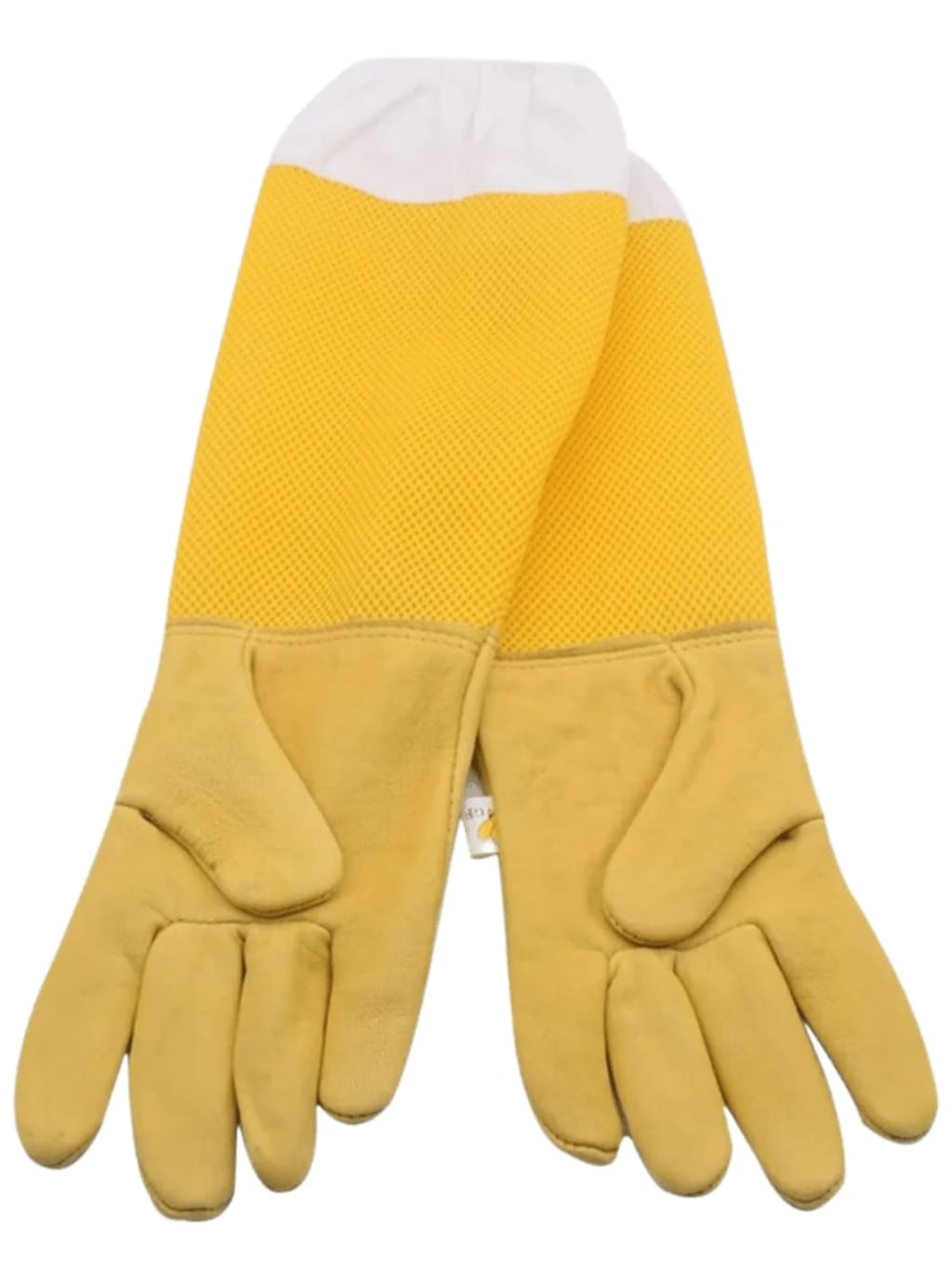Handy Protection: Exploring Best Beekeeper Gloves in Market
Best Beekeeping Gloves

Beekeeping, a practice that dates back thousands of years, continues to captivate people worldwide. It's not just about harvesting honey; it's a harmonious blend of nature, science, and patience. However, one crucial aspect often overlooked by beginners and sometimes even by experienced apiarists is the importance of protective gear, especially gloves. Beekeeper Gloves serve as a beekeeper's first line of defense against stings, allowing for safer and more enjoyable hive inspections and honey harvesting.
Understanding the Need
Beekeeping involves close interaction with bees, and while these insects are generally non-aggressive, their stings can be painful and, in some cases, dangerous. The primary function of gloves for beekeeping is to protect the beekeeper's hands from stings, reducing the risk of allergic reactions and discomfort. Gloves also provide a sense of security, which is especially important for beginners who might be nervous around bees.
But protection isn't the only factor to consider. The best beekeeper gloves should also offer comfort, flexibility, and durability. They should allow for precise movements, enabling beekeepers to handle delicate tasks such as inspecting frames, collecting honey, and managing the hive without compromising safety.
Cotton Beekeeping Gloves: Soft and Breathable Protection
They are a popular choice among beekeepers for several reasons. Their soft and breathable nature makes them comfortable to wear, especially during long hours in the apiary. Let's explore the benefits and drawbacks of cotton gloves in more detail.
Benefits of Cotton Beekeeping Gloves
Comfort and Breathability: Cotton gloves are known for their comfort. The natural fabric is breathable, allowing air to circulate and keeping the hands cool. This is particularly beneficial during hot weather when beekeepers can spend hours working in the sun.
Flexibility and Dexterity: One of the standout features of cotton gloves is their flexibility. They allow beekeepers to perform intricate tasks with ease, such as inspecting frames, handling tools, and managing the hive. The soft fabric conforms to the shape of the hand, providing excellent dexterity.
Cost-Effective: Cotton gloves are generally more affordable compared to other types. This makes them an attractive option for beginners or those on a budget.
Natural Material: Being made from a natural fiber, cotton gloves are eco-friendly and biodegradable. They don't contribute to plastic pollution, which aligns with the environmentally conscious practices of many beekeepers.
Goatskin Beekeeping Gloves: Durable and Flexible Protection
Goatskin beekeeping gloves are another excellent option for beekeepers. Known for their durability and flexibility, these gloves offer a higher level of protection while maintaining the dexterity needed for beekeeping tasks.
Benefits of Goatskin Beekeeping Gloves
Superior Protection: Goatskin gloves provide excellent protection against bee stings. The thick yet flexible leather acts as a barrier, preventing stingers from penetrating through to the skin.
Durability: Goatskin is a highly durable material, resistant to wear and tear. These gloves can withstand frequent use and last longer than cotton gloves, making them a cost-effective investment in the long run.
Flexibility and Dexterity: Despite their thickness, goatskin gloves are surprisingly flexible. The natural elasticity of the leather allows for precise movements, making it easier to handle frames, tools, and other beekeeping equipment.
Comfort: Goatskin gloves are often lined with soft materials, enhancing comfort. They also tend to mold to the shape of the hand over time, providing a custom fit that improves with use.
Choosing the Best Beekeeping Gloves for Your Needs
Selecting the best beekeeping gloves depends on several factors, including your experience level, the climate in which you beekeep, and your budget. Here are some considerations to help you make an informed decision:
Beginners may prefer cotton gloves due to their comfort and affordability. As you gain more experience and confidence, you might consider upgrading to goatskin gloves for better protection.
If you beekeep in a hot climate, the breathability of cotton gloves can be a significant advantage. In cooler climates, the superior protection of goatskin gloves might be more appealing.
If you spend a lot of time in the apiary, investing in durable goatskin gloves can save you money in the long run. For occasional beekeepers, cotton gloves may suffice.
Ultimately, the best beekeeper gloves are the ones you feel most comfortable using. Try out different types and see which ones suit your needs and preferences.
Maintaining Your Beekeeping Gloves
Proper maintenance of your gloves can extend their lifespan and ensure they continue to provide adequate protection. Here are some tips for caring for both cotton and goatskin gloves:
Cotton Gloves
Wash cotton gloves regularly to remove dirt and sweat. Use a gentle detergent and avoid bleach, which can weaken the fabric.
Allow the gloves to air dry completely before storing them. Avoid using a dryer, as the heat can shrink and damage the fabric.
Store cotton gloves in a cool, dry place away from direct sunlight. This prevents the fabric from becoming brittle and discolored.
Goatskin Gloves
- Wipe down goatskin gloves with a damp cloth to remove dirt and debris. For a deeper clean, use a leather cleaner specifically designed for gloves.
- Regularly condition the leather to keep it supple and prevent cracking. Use a high-quality leather conditioner and follow the manufacturer's instructions.
- Allow goatskin gloves to air dry naturally. Avoid using direct heat sources like radiators or hair dryers, as they can damage the leather.
- Store goatskin gloves in a cool, dry place. Avoid placing heavy objects on top of them, which can deform the shape.
The Role of Gloves in Beekeeping Safety
- They are more than just a protective barrier; they play a crucial role in overall beekeeping safety. Here are some additional safety tips to keep in mind when using:
- Always check your gloves for holes, tears, or signs of wear before each use. Damaged gloves can compromise protection and increase the risk of stings.
- Ensure your gloves fit well. Gloves that are too tight can restrict movement, while loose gloves can make it difficult to handle tools and frames. Both scenarios can increase the likelihood of accidents and stings.
- Gloves are just one part of your beekeeping protective gear. Always wear them in conjunction with a veil, suit, and sturdy footwear to maximize safety.
- Even with gloves, handling bees roughly can provoke them. Always move calmly and gently when working with your hive to minimize agitation and stings.
Conclusion
Choosing the best beekeeper gloves is an essential decision for any beekeeper. Whether you opt for the soft, breathable comfort of cotton gloves or the durable, flexible protection of goatskin gloves, both options have their unique advantages. By considering your specific needs, experience level, and the conditions in which you keep, you can select the gloves that best suit your practice.
Remember, the right pair of gloves can make a significant difference in your beekeeping experience, providing not only protection but also the confidence to work more effectively with your bees. As you continue your beekeeping journey with BeBees and invest in high-quality gloves. Take good care of them to ensure they serve you well season after season.
About the Creator
Enjoyed the story? Support the Creator.
Subscribe for free to receive all their stories in your feed. You could also pledge your support or give them a one-off tip, letting them know you appreciate their work.





Comments
There are no comments for this story
Be the first to respond and start the conversation.